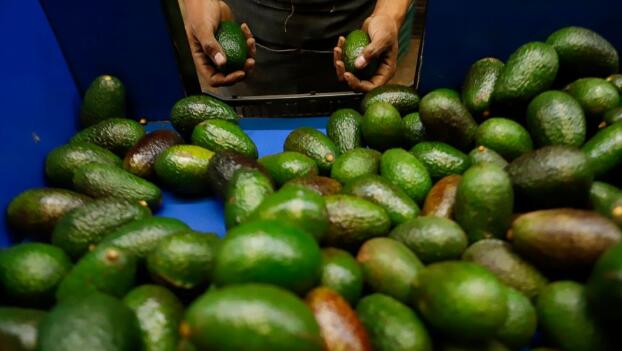
2nd state in Mexico begins avocado exports to U.S. market
MEXICO CITY — U.S. consumers will finally get the chance to try avocados from Jalisco after 25 years in which neighboring Michoacan has been the only Mexican state authorized to send the green fruit to the U.S. market.
That just may help with prices, which have soared this year to over $2 per fruit amid a dip in production in Michoacan.
Growers and packers in Jalisco, just northwest of Michoacan, expressed hope that their state can provide more consistent production levels and stability for prices for avocados, which have fluctuated widely amid seasonal supply shortages.
Eleven trucks bearing 200 tons of avocados from Jalisco lined up Thursday in the mountain town of Zapotlan El Grande to set out for the United States.
“When we were talking about very high prices a month ago, it was because the market wasn’t getting enough supply,” said Javier Medina Villanueva, president of the Jalisco Avocado Export Association. “So we believe that the entry of Jalisco will close that supply shortage. … I think prices will stabilize.”
Consumers in the United States won’t immediately recognize the difference: Jalisco avocados won’t bear any special tag, and will be labelled simply as “avocados from Mexico” — a phrase promoted for years by producers in Michoacan.
The head of the Michoacan-based Association of Mexican Avocado Growers and Packers, Jose Luis Gallardo, said he doesn’t see Jalisco, or any of the other Mexican states now clamoring for U.S. export certification, as competition.
“Today is a day of joy for everyone, knowing that Jalisco is here, but it is going to be happier when the State of Mexico comes, when Nayarit, Colima, Puebla, Morelos come,” Gallardo said of the other states, noting there was room for more exports; last season’s production in Michoacan was down by about 200,000 tons.
Mexico currently supplies about 92% of U.S. imports of the fruit, and Mexico’s agriculture department says it is working to get more states certified. About a half dozen states grow significant quantities of the fruit, which prefers higher altitudes and cooler climates in Mexico.
Medina Villanueva noted that meeting U.S. sanitary requirements wasn’t easy. “It took 10 years,” he said. “It took patience.”
U.S. agricultural inspectors have to certify that Mexican avocados don’t carry diseases or pests that would harm U.S. orchards. The Mexican harvest is January through March, while U.S production runs from April to September.
The inspections were halted in February for about 10 days after one of the U.S. inspectors was threatened in Michoacan, where growers are routinely subject to extortion by drug cartels. Some packers in Michoacan were reportedly buying avocados from other, non-certified states and trying to pass them off as being from Michoacan, and were angry the U.S. inspector wouldn’t go along with that.
Exports resumed after Mexico and the United States agreed “to enact the measures that ensure the safety” of the inspectors.
Francisco Trujillo, the head of Mexico’s plant and animal safety agency, noted that the Michoacan export ban should be a lesson for Jalisco producers.
“Caution should be part of this day of festivity,” Trujillo said, noting that avocados certified for export were worth four or five times as much as those destined for domestic markets, creating “temptations” to pass off non-certified fruit. “We could run the risk that this festive day becomes a tragedy” if the U.S. were to ban exports again, he said.
Exports were worth about $2.8 billion to Mexico in 2021. The price Mexican growers get for their crops — as little as $1 per pound — is still far higher than any other crop they could grow, so much so that avocados have lifted thousands of small producers out of poverty.
Jalisco Gov. Enrique Alfaro acknowledged that his state will have to avoid problems that have plagued the reputation of avocados in Michoacan, where some growers have cut down native pine forests to plant avocado trees and dried up local water supplies to irrigate them. Drug cartels have also extorted protection payments from avocado growers and packers.
Alfaro said Jalisco has plans “to develop a security program … so that this product can be produced in the orchards, be shipped through Jalisco and reach its final destination safely.”
Alfaro also said he would push to certify Jalisco avocados as free from deforestation, something Michoacan has been slow to do.
“The idea of pushing a plan to certify avocados as free from deforestation shouldn’t just be an issue for some growers. We want to establish that as an obligation for the good of the whole industry,” Alfaro said.
Anti-logging activist Guillermo Saucedo, who was abducted by gunmen in the town of Villa Madero, Michoacan in 2021, said he doubted the government or growers would act in his forest-clad hamlet, where he said newly cleared fields, wells and holding ponds used to water avocado plantations continue to appear.
“The authorities don’t take action,” said Saucedo. “They let them do whatever they want.”
At this point, Jalisco has only about 20,000 acres (8,420 hectares) of avocado orchards certified as pest free, a small amount compared to over nearly 300,000 acres (120,000 hectares) in Michoacan. But Alfaro said another 65,000 acres (26,000 hectares) in Jalisco were in line to be certified.
Comments (0)